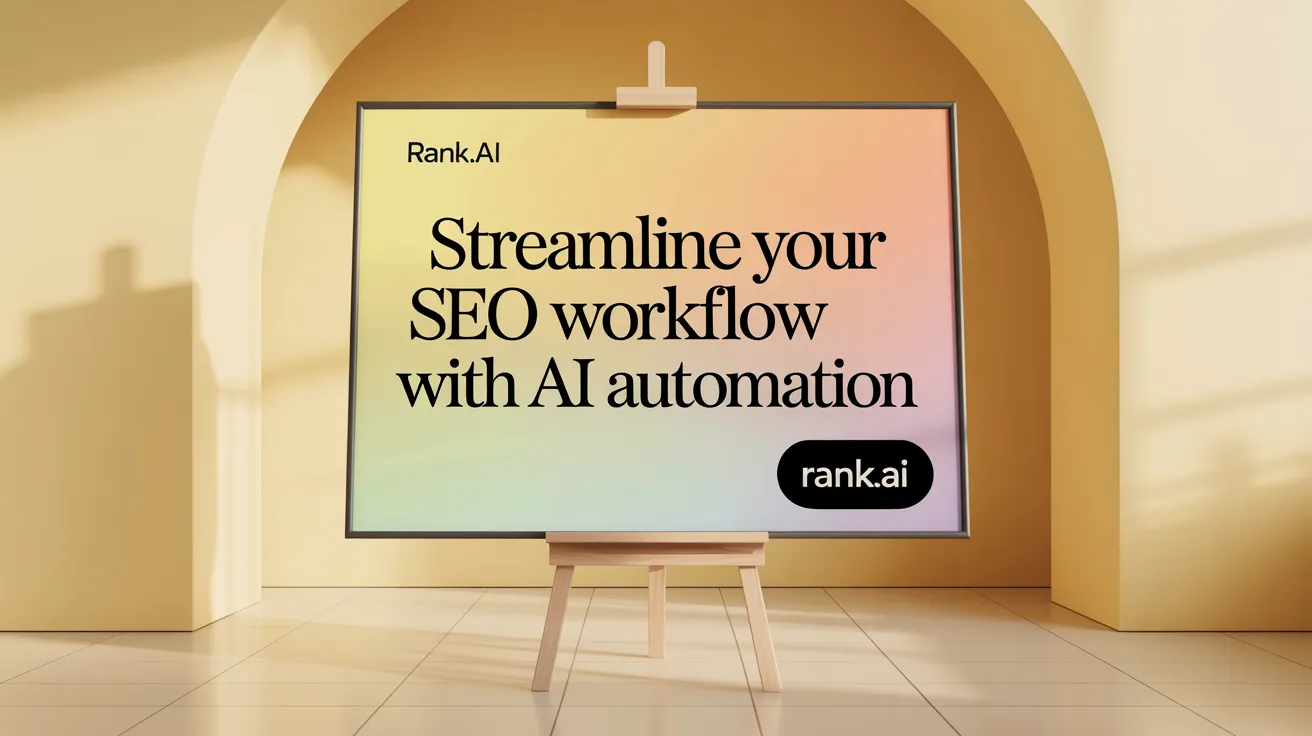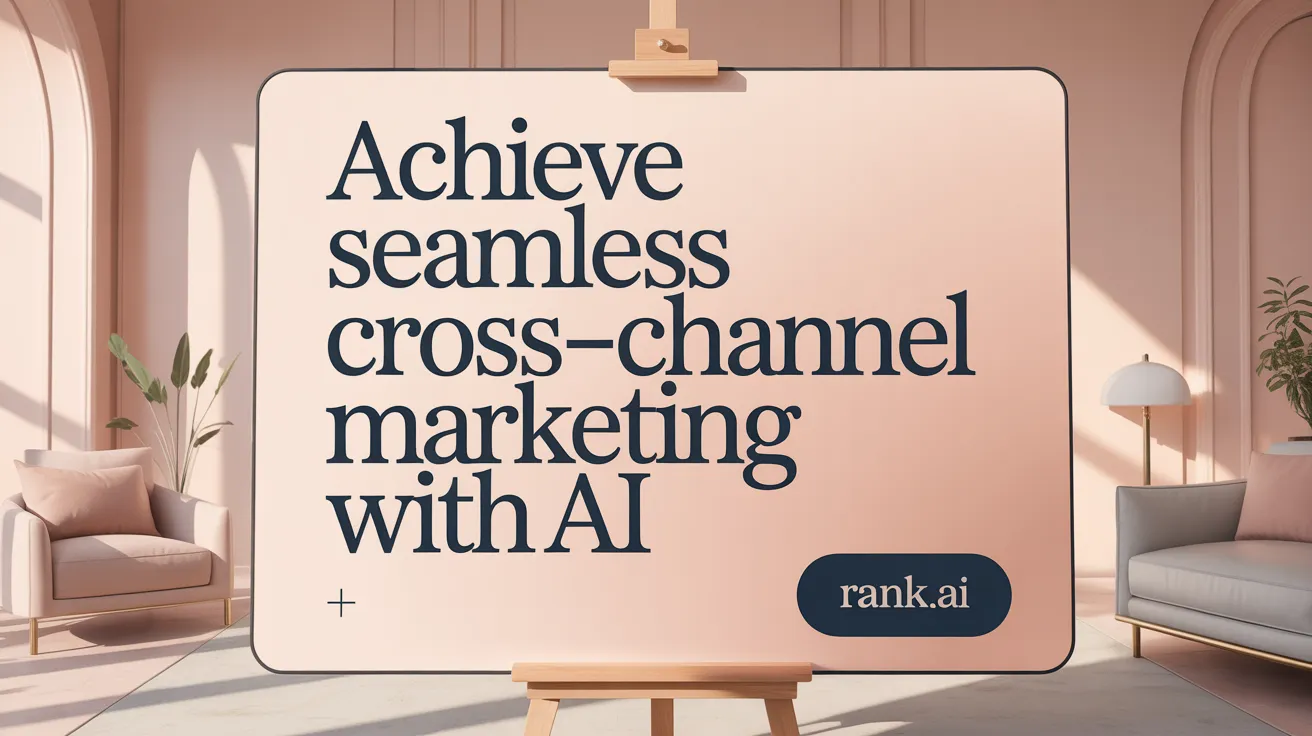Integrated AI SEO Platforms That Transform Your Marketing
Revolutionizing Digital Marketing with AI-Powered SEO Platforms

The AI Evolution in SEO and Marketing Integration
In 2025, the fusion of artificial intelligence and SEO has reached new heights, transforming how marketers approach digital visibility, content creation, and campaign management. Integrated AI SEO platforms have become indispensable tools for brands aiming to dominate both traditional and AI-driven search environments. Leveraging large language models (LLMs) and intelligent automation, these platforms streamline workflows, enhance content relevance, and provide data-driven insights, enabling marketers to deliver hyper-personalized experiences while maximizing efficiency and ROI. This narrative explores the capabilities, innovations, and strategic impacts of cutting-edge integrated AI SEO platforms that are reshaping marketing landscapes today.
Understanding Integrated AI SEO Platforms
What are integrated AI SEO platforms and how do they function?
Integrated AI SEO platforms combine artificial intelligence technologies such as large language models (LLMs) with advanced SEO tools to automate and optimize digital marketing workflows. They leverage natural language processing, machine learning, and automation to enhance keyword research, content creation, site audits, rank tracking, and performance analytics. This integration allows marketers to efficiently manage complex SEO and marketing tasks in a unified environment.
Definition and components of integrated AI SEO platforms
These platforms typically include components like AI-powered content optimization tools (e.g., Surfer SEO, Jasper AI), keyword and rank tracking modules, AI-powered technical SEO audit systems, backlink analysis, and real-time data monitoring. They often provide seamless connections to other marketing tools, integrating with analytics, social media management, and automation services to create streamlined workflows.
Role of large language models (LLMs) like ChatGPT, Claude, Gemini
LLMs serve as the AI core of these platforms by understanding and generating human-like language. They assist in content ideation, writing, editing, and generating SEO-friendly content based on search intent. Models like ChatGPT, Claude, and Gemini enable tasks such as generating FAQs, paraphrasing, summarizing, and automating conversational interfaces for customer engagement.
Importance of automation in SEO and marketing
Automation reduces manual effort and speeds up repetitive tasks like keyword research, content publishing, indexing, and data reporting. Platforms like Gumloop AI automation platform and Zapier automation platform use AI layers to connect different apps and internal tools without coding, enabling marketers to automate end-to-end workflows. This improves accuracy, consistency, and scalability, allowing teams to focus on strategic activities rather than routine execution.
The Role of Large Language Models in SEO and Marketing
How do large language models improve SEO and marketing processes?
Large language models (LLMs) such as ChatGPT, Claude, Gemini, and Grok play a transformative role in both SEO and marketing by generating content that is contextually relevant and closely aligned with user search intent. These models produce natural language outputs that help create optimized copy, FAQs, definitions, and summaries, enhancing the quality and relevance of content for traditional search engines and AI-driven platforms alike.
How LLMs like ChatGPT support SEO content creation
In SEO, LLMs assist in automating routine writing tasks, enabling marketers to generate high-quality articles, FAQs, and keyword-rich copy efficiently. For example, tools like Writesonic and Jasper AI leverage LLMs to craft content tailored to particular tones and styles, accelerating content production while maintaining adherence to SEO best practices. They also facilitate content optimization by suggesting relevant keywords and enhancing readability.
Enhancing marketing communication with AI text generation
Marketing communications benefit from LLMs through hyper-personalization, where AI analyzes customer preferences and behaviors to tailor messages. Platforms powered by LLMs automate email campaigns, social media posts, and ad copy to be more engaging and relevant. This not only saves time but improves customer engagement and conversion rates by delivering content that resonates on an individual level.
Examples of AI platforms incorporating LLMs
Several AI platforms integrate LLMs into their workflows to boost SEO and marketing efforts. Notable tools include Gumloop AI automation platform, which connects LLMs to internal business tools without coding; Jasper AI copywriting tool for versatile copywriting; Surfer SEO content optimizer for content optimization; and Brandwell AI SEO blog posts for AI-generated SEO blog posts. In marketing, platforms like Albert.ai digital advertising optimization optimize ad campaigns through AI-driven personalization, while Chatfuel AI chatbots enable chatbot creation powered by AI conversational models.
These examples illustrate the expanding reach and efficacy of LLMs, making them indispensable in modern SEO and marketing strategies.
Key Features of Leading AI SEO Platforms
What functionalities define top AI SEO platforms?
Leading AI SEO platforms offer an extensive suite of tools designed to enhance various aspects of search engine optimization. These platforms typically include:
SEO Audit and Content Optimization: Comprehensive site auditing tools identify technical issues, broken links, duplicate content, and provide actionable recommendations. Platforms like seoClarity, Surfer SEO, and SEOptimer analyze on-page elements such as keyword density, readability, headings, and metadata, offering real-time content scoring and optimization advice that aligns with search intent and E-E-A-T principles as emphasized in AI SEO Tools Overview. Additionally, AI-powered technical SEO audit capabilities enhance the detection of critical site issues and improvements.
Keyword Research, Rank Tracking, and Backlink Analysis: Advanced keyword tools evaluate search trends, user intent, and competitor strategies to suggest high-value keywords and clusters. Rank trackers monitor website positions across traditional search engines and emerging AI-powered engines (e.g., ChatGPT, Perplexity). Backlink profilers analyze link quality, identify opportunities, and forecast backlink value, with tools like Ahrefs and Semrush excelling in this area. The integration of AI SEO tools enhances these functionalities through AI-driven insights.
Automation of Technical SEO and Indexing: Platforms automate tedious technical SEO tasks—such as internal linking, schema markup, site speed optimization, and sitemap management. Indexing tools like Indexly speed up page discovery by search engines, especially useful for new or large e-commerce sites. Workflow automation through integrations with Zapier, Gumloop, or AirOps supports seamless data flow and reporting.
Many of these platforms integrate with third-party data sources such as Google Search Console, Semrush, and Google Analytics to provide a unified dashboard experience. AI-driven analytics interpret complex data sets to surface trends and deliver predictive insights, leveraging AI-powered SEO tools.
By combining comprehensive audits, data-driven keyword and backlink analysis, and automation of repetitive tasks, top AI SEO platforms empower marketers to optimize websites more efficiently while maintaining high-quality, user-focused content.
| Feature | Description | Example Platforms |
|---|---|---|
| SEO Audit & Optimization | Site audits, content structuring, real-time scores | seoClarity, Surfer SEO |
| Keyword Research & Rank Tracking | Search intent analysis, multi-engine ranking | Semrush, SE Ranking, Ahrefs |
| Backlink Analysis | Link profiling, competitor link strategies | Ahrefs, Semrush |
| Technical SEO Automation | Schema, speed, internal links, bulk optimizations | Alli AI, Search Atlas |
| Indexing Automation | Fast page indexing, sitemap management | Indexly |
| Workflow Integration | API connections and task automation | Gumloop, Zapier, AirOps |
AI Content Creation and Optimization Tools
Which AI tools excel in content creation and how do they ensure quality?
AI content creation platforms such as Jasper AI copywriting tool, Surfer SEO content optimizer, Clearscope content optimization, and Frase AI writing tools have become essential for marketers aiming to boost SEO performance in 2025. These tools combine advanced large language models (LLMs) with SEO data and keyword analysis to generate content that is optimized for readability, relevance, and user intent.
Jasper AI specializes in producing diverse content types including blogs, emails, and product descriptions. It offers customization for tone and style, helping maintain brand consistency. Jasper integrates large datasets and language patterns to ensure natural, engaging output.
Surfer SEO merges content optimization with search engine result page (SERP) analysis. It offers real-time content scoring against top-ranking pages, keyword clustering, and content structure suggestions to maximize SEO value. See also Surfer AI-powered content optimization.
Clearscope provides detailed keyword recommendations and content grading, focusing on semantic relevance and clarity to help content creators meet industry standards for quality. More at Clearscope content optimization insights.
Frase automates in-depth content research by analyzing live top search results and generating SEO-focused briefs. It supports content drafting with customization in tone, length, and structure. See Frase for marketing agencies.
These platforms maintain quality through a combination of AI-generated suggestions and the critical oversight of human editors. Tools like Originality AI content detection detect AI-generated content and plagiarism, helping preserve authenticity. Furthermore, aligning content with Google's E-E-A-T principles for SEO ensures content is trustworthy, expert, and valuable, reducing the risk of search penalties.
Balancing AI-generated content with human oversight
Although AI greatly expedites content creation, human review remains vital for maintaining accuracy, tone, and compliance with SEO guidelines. Editors can refine AI drafts to better match brand voice, fact-check information, and enhance creativity. This collaborative approach prevents low-quality or robotic content that might hurt rankings. Additional insights on combining AI and human oversight are useful.
Tools for multilingual and tone customization
Many AI content tools support multilingual content creation and allow tone adjustments to suit diverse audiences. For example, Jasper AI and Koala AI content creation enable users to specify language and style preferences, ensuring content resonates globally while preserving SEO integrity. These features help brands scale content production while maintaining personalization and engagement across markets.
AI Automation in SEO Workflows

How does AI automation enhance SEO workflows?
AI automation significantly streamlines SEO workflows by integrating various AI marketing tools and AI SEO tools into cohesive systems without the need for complex coding.
Platforms like Gumloop AI automation platform, AirOps SEO Automation, and Zapier automation platform allow marketers to automate repetitive tasks such as data collection, content optimization triggers, report generation, and multi-platform publishing. These tools act as connectors between large language models (LLMs) and internal tools, making it easier to execute complex SEO strategies efficiently.
Technical SEO benefits from automation through specialized tools such as Alli AI technical SEO tool and Indexly website indexing. Alli AI automates critical functions like on-page SEO improvements, internal linking structures, and website speed optimization. Indexly accelerates the indexing process for websites by automatically submitting new pages to search engines, enhancing visibility and ranking speed.
This use of AI automation reduces manual effort, allowing SEO teams to focus on strategic decisions rather than routine tasks. It facilitates scaling SEO campaigns faster and promotes better collaboration among team members through shared, automated workflows.
Overall, AI automation delivers increased productivity, faster campaign execution, and improved outcomes in SEO marketing efforts.
Integrating Brand Visibility Across AI Search Engines

What is Generative Engine Optimization (GEO)?
Generative Engine Optimization (GEO) is a new approach to SEO focusing on optimizing content for AI-driven search engines and large language models such as ChatGPT, Claude, Perplexity, Gemini, and Google's AI Overviews. Unlike traditional SEO that targets ranking positions on search engine results pages, GEO aims to secure brand mentions and citations within AI-generated answers. This shift reflects changing search behaviors where users increasingly rely on AI assistants for immediate, direct responses.
Why is AI search visibility important and how is it tracked?
AI search visibility is crucial because AI platforms process billions of queries monthly, offering new pathways for brands to gain recognition and traffic. Successful visibility ensures brands are included in AI responses, influencing consumer decisions and enhancing credibility.
Tracking AI mentions and citations requires specialized tools. Platforms like Gauge provide comprehensive prompt tracking, citation analysis, and region-specific insights by monitoring how often and where a brand appears across multiple AI engines. Rankscale.ai and Profound similarly track brand visibility, analyze sentiment, and evaluate competitive standings across AI conversational search platforms. These tools deliver real-time data and actionable recommendations to improve AI search presence.
What role does multi-platform AI search visibility play?
Given that AI search is fragmented across several engines and conversational models, sustaining visibility on just one platform is insufficient. Multi-platform monitoring and optimization are essential to cover ChatGPT, Claude, Perplexity, Gemini, and Google’s AI Overviews effectively. This ensures a broad reach where potential customers engage with different AI tools, adjusting content strategies to fit each platform’s nuances.
By integrating Generative Engine Optimization (GEO) strategies and employing advanced monitoring tools, businesses can capture diverse AI-driven traffic sources, maintain competitive advantages, and adapt swiftly to evolving AI search landscapes.
Comprehensive AI SEO Suites: Semrush, BrightEdge, and seoClarity
What makes AI SEO suites like Semrush and BrightEdge essential for marketers?
AI-powered SEO suites such as Semrush, BrightEdge, and seoClarity have become indispensable tools for marketers aiming to optimize their digital presence efficiently. These platforms combine multiple SEO functionalities into integrated, user-friendly dashboards that support both SMBs and large enterprises.
All-in-one AI SEO management platforms
Semrush offers a robust AI Toolkit that includes capabilities for rank tracking, keyword discovery, backlink analysis, site audits, and content marketing automation. BrightEdge distinguishes itself with its Data Cube engine, which leverages over 4 billion data points and a decade of historical data to enhance keyword research and performance tracking. SeoClarity features a generative AI assistant, Sia, that aids in content creation and optimization alongside comprehensive SEO analysis tools.
Capabilities in rank tracking, keyword discovery, content automation
These suites provide scalable rank tracking with real-time updates, deep keyword insights, and competitor analysis. Content automation is supported through AI-generated content templates, optimization suggestions, and integration with content management systems. Semrush integrates AI-based content planning with automated SEO insights, while BrightEdge's Copilot offers actionable recommendations and Autopilot automates website improvements.
Integration with AI assistants and data analytics
All three platforms embed AI assistants to assist with strategic decision-making. Semrush's AI Toolkit analyzes brand presence across multiple AI platforms, whereas BrightEdge's Copilot leverages AI to detect live trends and automate tasks. SeoClarity's Sia facilitates content optimization by providing data-driven suggestions for improving rankings.
Together, these AI SEO suites streamline workflows, elevate data-driven strategies, and empower marketers to maintain competitive advantage in the evolving SEO landscape.
AI-Assisted Content Personalization and Hyper-Personalization
Using AI to analyze customer data for tailored marketing
AI technologies have revolutionized how marketers understand and engage with their audiences by analyzing vast customer data to deliver highly tailored marketing experiences. By leveraging machine learning and natural language processing, AI examines user behavior patterns, preferences, and engagement to identify actionable insights, enabling brands to craft personalized content and recommendations that resonate with individual users.
Integration in email, landing pages, ads
Personalization extends across multiple marketing channels. AI marketing tools dynamically adapt email marketing campaigns, optimizing both content and sending times tailored to individual recipient behavior. Landing pages are customized on the fly to match user segments, increasing the chance of conversion. Similarly, digital advertisements benefit from Albert.ai digital advertising optimization that adjusts creatives and bids based on audiences’ real-time interaction and preferences, boosting ROI.
Examples of AI tools supporting personalization
Several AI platforms facilitate this hyper-personalized marketing approach. Albert.ai is a standout example, offering automated digital advertising optimization across channels by analyzing audience data to refine ad delivery and targeting. Jasper AI assists marketers in generating contextually relevant copy for different segments, ensuring brand voice consistency. Additionally, platforms like HubSpot marketing automation and Salesforce Einstein AI leverage AI to personalize customer journeys and communications, creating seamless, individualized experiences.
How do integrated AI SEO platforms enable personalized marketing?
Integrated AI SEO platforms use sophisticated analytics to assess user behavior and engagement patterns, allowing marketers to deploy hyper-personalized campaigns. By processing data from search activity, content interactions, and demographic profiles, these platforms empower marketers to tailor emails, landing pages, and ads dynamically. This leads to more meaningful user interactions and improves conversion rates by delivering the right message to the right audience at the right time.
Ensuring Content Authenticity and Compliance with AI

How do platforms maintain authenticity and comply with search engine guidelines when using AI?
AI-generated content can challenge authenticity and compliance with search engines, but new tools help address these issues.
Platforms use AI content detection tools like Originality AI to identify text that may be AI-generated or plagiarized. This detection serves as a safeguard to ensure that content maintains originality and transparency.
To make AI-generated content feel more natural, tools like Undetectable AI rewrite text so it sounds more human. This approach complements detection software by improving the flow and tone of content while avoiding robotic patterns.
However, technology alone is not enough. Marketers and creators need to apply human oversight to AI outputs. This step involves editing and refining to align closely with Google's E-E-A-T guidelines — focusing on Experience, Expertise, Authority, and Trustworthiness.
Adhering to these principles means producing content that is helpful, reliable, and people-first. It ensures the information genuinely benefits users and avoids penalties related to low-quality or deceptive content.
By combining detection, rewriting technologies, and human judgment, platforms can responsibly leverage AI to optimize content without sacrificing authenticity or compliance.
Impact of AI on Traditional SEO Practices

How is AI reshaping traditional SEO strategies?
AI has ushered in a fundamental transformation of SEO methodologies, moving away from solely focusing on keywords to a more sophisticated approach centered on user intent. Modern search engines like Google employ AI-powered natural language processing models, including BERT and RankBrain, to better interpret the context behind queries. This allows content creators to design pages that answer real user questions more effectively, rather than just targeting specific keywords.
Shift from keyword-centric to intent-focused SEO
Traditional SEO prioritizes keyword frequency and placement. AI-enhanced SEO now emphasizes understanding what users actually want when they search. This shift leverages semantic analysis and intent prediction, making SEO strategies more aligned with producing helpful, trustworthy, and expert content that matches searcher expectations (AI SEO Tools Overview, Google's E-E-A-T for SEO).
Incorporation of voice and visual search optimization
The increasing use of voice assistants and visual search tools has expanded the SEO landscape. AI helps optimize for voice search by accommodating natural, conversational phrases and long-tail keywords, which differ from typed text queries (AI transforming SEO, AI for SEO guide 2025). Visual search optimization involves AI image recognition technologies, enhancing discoverability through well-tagged images and multimedia elements that fulfill user intent visually (Algolia search and recommendation API, PhotoRoom AI background remover).
Role of AI in technical site audits and trend forecasting
AI-powered tools streamline technical SEO by identifying website issues such as broken links, slow loading, and crawl errors automatically. They offer actionable insights to fix these problems promptly, improving site health and search rankings (AI-powered technical SEO audit, seoClarity all-in-one SEO platform). Additionally, AI enables trend forecasting by analyzing vast data sets to predict shifts in search algorithms and user behavior, allowing marketers to adapt their SEO tactics proactively (BrightEdge AI-powered SEO platform, AI transforming SEO).
This integration of AI creates more efficient, accurate, and user-focused SEO practices, vital for maintaining visibility in an increasingly competitive digital space.
AI-Powered Analytics and Reporting for SEO and Marketing
How do integrated AI SEO platforms improve analytics and reporting?
Integrated AI SEO platforms consolidate data from various sources like Google Analytics, Google Search Console, Semrush, and social media into a unified dashboard. This integration simplifies the complexity of managing multiple tools by providing a centralized view of key performance indicators and metrics.
Platforms such as Whatagraph SEO Reporting, Rows AI Analyst features, and other AI SEO tools automation stand out by enabling marketers to perform natural language queries on SEO data. Rows, with its AI Analyst feature, allows users to summarize, pivot, and analyze data sets without the need for complex formulas or scripts. This level of interaction helps translate raw data into meaningful insights quickly.
Moreover, these tools automate report generation with AI-driven summaries and trend detection. For example, Whatagraph creates comprehensive reports by connecting multiple data streams and offering AI-powered summaries that highlight significant changes or anomalies. This facilitates communication of campaign progress and results to clients or internal teams effectively.
The use of AI to visualize and interpret SEO analytics enhances decision-making by pinpointing opportunities for optimization, identifying content gaps, and forecasting performance trends. Marketers gain greater agility, allowing them to refine strategies, allocate resources wisely, and respond promptly to market changes.
In summary, integrated AI analytics and reporting platforms enable faster, more accurate data interpretation, empower marketers with actionable insights, and result in smarter, data-driven SEO and marketing decisions.
Enhancing User Experience and Conversion Through AI
In what ways do integrated AI SEO platforms enhance user engagement and conversions?
AI technology plays a pivotal role in understanding and improving user experience (UX) to boost engagement and conversion rates. Platforms like FullStory user journey analysis utilize AI to analyze user journeys on websites, detecting friction points such as high bounce rates or drop-off moments. This data enables marketers and developers to implement targeted UX modifications that smooth navigation and retain visitors longer.
User behavior analysis with FullStory AI
FullStory employs AI-driven analytics to capture detailed user interaction data. By interpreting clicks, scrolls, and other behaviors, it uncovers insights into how users engage with content and where they encounter difficulties. This granular analysis helps businesses optimize site design and content placement to better meet user needs and expectations.
AI-based chatbot and customer engagement tools (Chatfuel AI chatbots, Userbot.ai customer conversation management
Chatbots powered by AI transform customer engagement through natural, conversational interfaces. Chatfuel AI chatbots allows the creation of personalized chatbots across platforms for FAQ handling and lead generation, providing instant, tailored responses. Userbot.ai customer conversation management further enhances conversation management by learning continuously from interactions to improve customer support and sales communication, ensuring a more human-like and satisfying user experience.
AI-generated landing pages for higher conversions
Dedicated AI tools like Headlime AI landing page copy specialize in crafting landing pages with AI-generated copy optimized for conversion. Through data-backed templates and content tailored to audience intent, these tools deliver persuasive messaging and calls-to-action that align with brand voice and increase conversion potential.
Together, these AI-driven solutions—from user behavior analytics to conversational chatbots and bespoke landing pages—create a cohesive ecosystem that refines digital customer journeys and significantly raises user engagement and conversions.
Cross-Channel Marketing Optimization Using AI

How do AI SEO platforms integrate with other marketing channels for optimization?
AI SEO platforms are expanding their capabilities by integrating seamlessly with other marketing channels, including social media and email marketing, to enable synchronized campaign management. This integration allows marketers to execute cohesive strategies that leverage AI-driven insights across multiple platforms.
Integrating SEO with social media and email marketing automation
AI tools help unify different marketing functions by connecting SEO efforts with social media automation and email campaigns. For example, Sprout Social AI uses AI to automate publishing schedules, monitor audience sentiment, and analyze social engagement, ensuring social accounts align with SEO objectives. Albert.ai enhances digital advertising campaigns by automatically adjusting targeting and spend across social media and search platforms for higher relevance. Email marketing platforms such as Reply.io AI sales email assistant utilize AI to personalize outreach and automate follow-ups, while Grammarly ensures that email communication maintains impeccable grammar and style, enhancing professionalism and clarity.
Tools like Sprout Social, Albert.ai, Reply.io, and Grammarly
- Sprout Social: Automates social media publishing, delivers sentiment analysis, and powers smarter audience engagement.
- Albert.ai: Optimizes ad campaigns dynamically across various channels, improving targeting and budget allocation.
- Reply.io: Facilitates AI-generated and personalized email sequences, increasing outreach efficiency.
- Grammarly: Provides real-time grammar and style checks, ensuring clear and effective messaging.
Benefits of synchronized AI-driven campaigns
By leveraging AI across SEO, social media, and email, businesses gain enhanced marketing efficiency and consistent messaging across channels. AI-powered automation reduces manual workloads, accelerates campaign deployment, and produces data-driven personalization. This cross-channel optimization sharpens targeting, boosts engagement rates, and ultimately improves return on investment, making marketing efforts more agile and impactful in today’s competitive digital landscape.
The Future Outlook: Ethical and Practical Considerations in AI-Driven SEO
What ethical and practical considerations accompany the rise of AI in SEO and marketing?
The adoption of AI in SEO and marketing introduces critical ethical and practical concerns that organizations must address to ensure sustainable and effective use. Responsible AI use is essential, emphasizing transparency about how AI technologies influence content and decisions. Companies must actively mitigate biases in AI outputs and rigorously protect user privacy, fostering trust among consumers and compliance with regulations. For a deeper understanding of responsible AI implementation, explore resources like Leveraging AI for Digital Marketing and AI SEO Tools Overview.
Human oversight remains a vital component. While AI can automate repetitive tasks such as keyword research and content creation, human experts are needed to maintain brand voice, verify authenticity, and align output with ethical and quality standards. This balance prevents over-reliance on automation, which could otherwise lead to generic or misleading content. For insights on integrating AI with human expertise, see AI and SEO Integration and AI SEO Tools Automation.
Setting clear boundaries and performance metrics helps organizations monitor AI usage and outcomes effectively, ensuring that AI supports rather than supplants human creativity and judgment. Employing trustworthy, well-monitored AI tools also safeguards against unintended errors or SEO penalties associated with non-compliant content. Consider exploring Best AI SEO Tools 2025 and AI SEO Tools Automation for practical tool recommendations and monitoring strategies.
In summary, the future of AI-driven SEO requires a thoughtful approach where technology empowers marketers but respects ethical frameworks, privacy concerns, and the indispensable role of human insight. Comprehensive guides like How AI is Transforming the Future of SEO and AI SEO Best Practices provide further reading on maintaining this balance.
Embracing Integrated AI SEO Platforms for Marketing Excellence
Integrated AI SEO platforms represent the forefront of digital marketing innovation, enabling organizations to navigate an increasingly complex search landscape characterized by AI adoption and evolving user behaviors. By combining automation, advanced content creation, comprehensive analytics, and multi-channel personalization, these platforms empower marketers to deliver relevant, engaging, and authoritative content at scale. The future of marketing hinges on responsibly leveraging these AI-driven tools while maintaining human creativity and strategic oversight, ensuring authenticity and compliance. Embracing integrated AI SEO platforms not only catalyzes marketing efficiency but also lays the foundation for sustained competitive advantage in the AI-powered digital era.
Table of contents
Recent articles
Fresh insights on AI and SEO to help you stay ahead of the curve.


Ready to Improve
Your Rankings?
Use our free tools to get instant insights into your SEO performance and discover opportunities to rank higher




